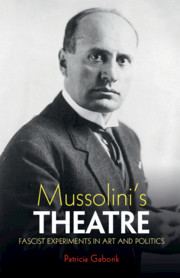Book contents
- Mussolini's Theatre
- Mussolini's Theatre
- Copyright page
- Dedication
- Epigraph
- Contents
- Figures
- Tables
- Acknowledgments
- Fascist Organizations and Offices, Acronyms, and Titles
- Introduction
- Chapter 1 Mussolini the Critic
- Chapter 2 Mussolini the Impresario, I
- Chapter 3 Mussolini the Dramatist
- Chapter 4 Mussolini the Censor
- Chapter 5 Mussolini the Impresario, II
- Epilogue
- Reference Matter
- Notes
- Index
Chapter 2 - Mussolini the Impresario, I
Fascism and the Art Theatre
Published online by Cambridge University Press: 15 April 2021
- Mussolini's Theatre
- Mussolini's Theatre
- Copyright page
- Dedication
- Epigraph
- Contents
- Figures
- Tables
- Acknowledgments
- Fascist Organizations and Offices, Acronyms, and Titles
- Introduction
- Chapter 1 Mussolini the Critic
- Chapter 2 Mussolini the Impresario, I
- Chapter 3 Mussolini the Dramatist
- Chapter 4 Mussolini the Censor
- Chapter 5 Mussolini the Impresario, II
- Epilogue
- Reference Matter
- Notes
- Index
Summary
“Mussolini the Impresario, I: Fascism and the Art Theatre” retraces Mussolini's first incursions into the world of theatrical sponsorship with two Roman playhouses: Luigi Pirandello’s Teatro d’Arte di Roma and Anton Giulio Bragaglia’s Teatro Sperimentale degli Indipendenti. Casting these early endeavors as exploratory missions to determine what kinds of artistic partnerships – and what kinds of plays – could benefit the fascist “revolution,” Gaborik uses performance analysis, official and private correspondence, and journalistic reporting to reconstruct developments in the regime’s patronage schemes and Mussolini's collaboration strategies. These case studies reveal complex negotiations, agreements between intellectual courtiers and their king, rather than a simplistic wielding of the authoritarian’s carrot or stick. Further, through a focus on Pirandello’s and Bragaglia’s revolutionary methods, particularly their championing of the theatre director (a figure then unfamiliar in Italy), the chapter highlights il Duce’s desire for innovation and his optimism that high art could help achieve his political ends.
Keywords
- Type
- Chapter
- Information
- Mussolini's TheatreFascist Experiments in Art and Politics, pp. 76 - 112Publisher: Cambridge University PressPrint publication year: 2021

